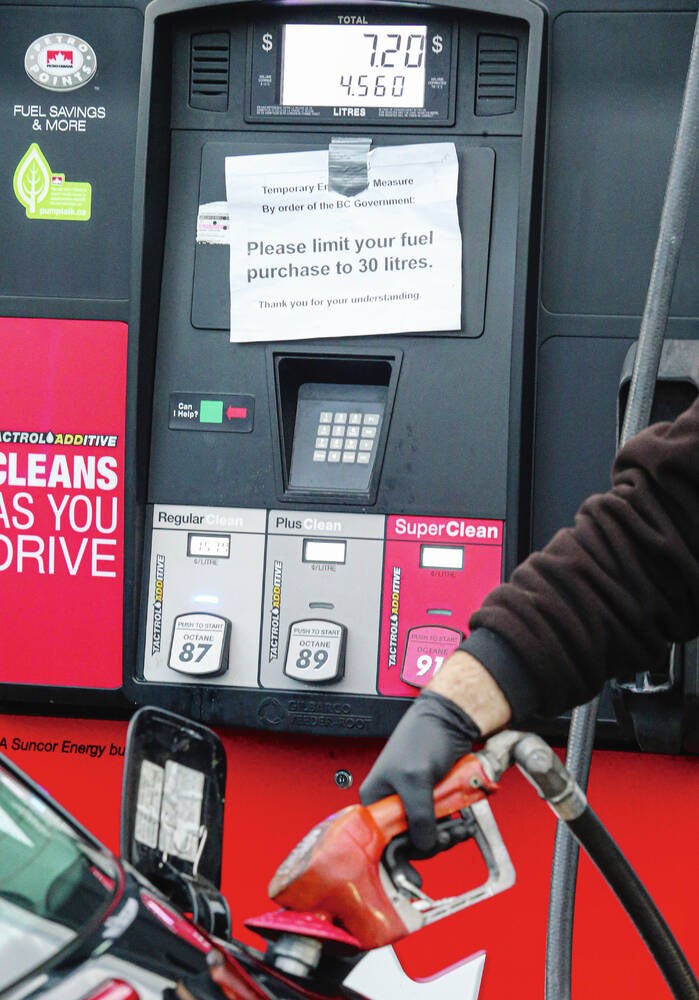
B.C. is extending gas and travel restrictions to Dec. 14, Deputy Premier Mike Farnworth announced Monday.
Drivers who aren’t operating essential vehicles are limited to purchasing 30 litres of fuel per trip to the gas station on Vancouver Island and the Gulf Islands and in the Lower Mainland as far as Hope, the Sunshine Coast, and the Sea-to-Sky region. Restrictions had been due to end Wednesday.
“The fuel-conservation measures are working and I want to thank British Columbians for their patience,” said Farnworth. “But we need to stay the course for another two weeks until we have the Trans Mountain Pipeline back online.”
Trans Mountain, which brings in about 85 per cent of the fuel required in B.C. for refining, shut down its pipeline Nov. 14 due to heavy rainfall and flooding.
On Monday the company said based on current conditions and progress — in the face of challenges with weather and access — “we are still days away from restarting the pipeline at reduced capacity.”
Work was interrupted at some sites on Sunday due to high water or lack of access, said Trans Mountain.
Bruce Ralston, minister of energy, mines and low carbon innovation, said that crews are “working around the clock” to restart the line in a phased approach, but Trans Mountain is watching an incoming weather system closely.
The pipeline provides a majority of transportation fuels for the Lower Mainland and Vancouver Island, Ralston said.
CP Rail moved refined products such as gasoline and diesel into southwestern B.C. in the last week, he said.
Farnworth said the province needs to ensure its supply chains and emergency services have the fuel that they need to function.
Highways 3, 7 and 99 will continue to be limited to essential travel only, with the state of emergency extended to Dec. 14.
“Extending the state of emergency will support the ongoing response and recovery from the widespread damage already caused by flooding while positioning us to take all necessary steps in the days ahead,” said Farnworth.
Environment Canada is warning of another storm Tuesday with extreme rainfall that could worsen existing flooding or bring new flooding around the province.
Armel Castellan, meteorologist for Environment Canada, said a rainstorm Tuesday through Wednesday is expected to bring 50 to 100 millimetres of rain, with the worst of the storm delivering as much as 200 millimetres in regions such as the northwest end of Vancouver Island, from Tofino north.
David Campbell, head of the River Forecast Centre, said northern Vancouver Island has been added to its flood watch warnings. River levels are expected to see rapid rises through Wednesday.
In an update on flood-related repairs and emergency measures, Transportation Minister Rob Fleming said the Malahat — washed out in parts during heavy rainfall on Nov. 14- 15 — will be monitored and inspected during the next few storms.
Fleming asked drivers to watch their speed and continue checking DriveBC.ca for the latest highway conditions.
ceharnett@timescolonist.com
https://news.google.com/__i/rss/rd/articles/CBMiVGh0dHBzOi8vd3d3LnRpbWVzY29sb25pc3QuY29tL2xvY2FsLW5ld3MvZ2FzLXJlc3RyaWN0aW9ucy1leHRlbmRlZC10by1kZWMtMTQtNDgxMTI5NNIBAA?oc=5
2021-11-30 05:30:00Z
1186145214
Tidak ada komentar:
Posting Komentar